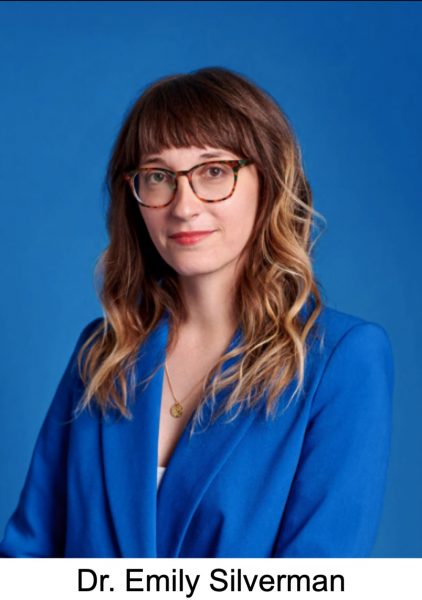Since 2016, Dr. Emily Silverman has been using live storytelling shows as well as a podcast called “The Nocturnists” to “cultivate the well-being of healthcare workers, enable compassionate patient care, and contribute to meaningful public dialogue about the practice of medicine.”
In March 2022, Dr. Silverman teamed up with Doctors Without Borders for a storytelling event during which doctors across the globe shared personal experiences with COVID-19. After viewing this event and listening to several episodes of “The Nocturnists,” we reached out to Dr. Silverman to learn more about the impacts of her storytelling work.
Whether or not you are directly involved in healthcare, we believe readers who operate in large systems and who are trying to make the world a better place can relate to feeling burned out and weighed down by high expectations. For these ailments, Dr. Silverman prescribes sharing stories.
 Kirsten Farrell: On your website, you talk about starting “The Nocturnists” to answer questions about the disconnect between patients and doctors, clinician burnout and distress, and what it means in the modern world to be a doctor. Could you tell me more about that?
Kirsten Farrell: On your website, you talk about starting “The Nocturnists” to answer questions about the disconnect between patients and doctors, clinician burnout and distress, and what it means in the modern world to be a doctor. Could you tell me more about that?
Dr. Emily Silverman: In the last decade or two, medicine has really changed. I came of age in medicine during a time where the healthcare system was becoming way more complicated and dysfunctional. The electronic health record was coming onto the scene, everything was going onto the computer. The days of the community doctor hanging up a shingle and taking care of patients were on their way out. Big health systems, big hospitals are gobbling up independent practice and the vast majority of physicians in the United States are employed now by these big companies, which are profit driven. They push the doctors to do more and more and more with less and less and less.
I started to feel this as a resident. Why am I sitting on a computer for half the day typing and doing data entry? I thought that medicine was going to be spending time with patients and their families. Why am I running my own body into the ground, and then, in the same breath, telling my patients to get better sleep and decrease their stress? It didn’t make sense to me, and I started to experience a lot of burnout. Even before COVID, physician burnout was a huge issue. A lot of my colleagues were feeling the same way.
Then a friend invited me to a live taping of “The Moth.” And something clicked. I thought, “This is something we should be doing in medicine.” There’s something about that very ancient form of oral storytelling. People together in a room and the magic and the electricity of that live experience.
And so, on my days off from my residency, I would drive around San Francisco and show up at different theatres, walk in and say, “I’m Dr. Emily Silverman, and I want to rent this theatre.” Finally, I found this place that let me rent a space for $90. That was 2016. I got an audience of 30 or 40 people, and I got eight people to tell stories. It was so successful that 4 years later we are selling out a theatre of 700 people.
It was this magical thing: you walk into the theater and look around and you see med students and nurses and doctors and therapists. There are people from UCSF, Stanford, Kaiser, Marin and Oakland all coming together to have an experience.
Farrell: What have you noticed or heard from medical professionals who tell their stories? What is the effect on them?
Silverman: I think one of the ways the storytellers benefit from the experience is that we give them a practical opportunity to let go, to surrender and to get into their bodies. Our culture tells us, “Oh, you don’t need sleep,” or “You don’t get sick, you can just work 8 hours a week. Take care of people while you’re sleep deprived.”
Medical training really changes our brains. It suppresses the side that is more improvisational and reflective. But as an embodied practice, it can be really exciting for physicians to reconnect with those parts of themselves. We also pair them up with a story coach who can help them unpack their story and maybe make some meaning out of it.
To get on stage in front of an audience of 700 of your peers and tell the story about a time that you experienced doubt or made a mistake is very, very countercultural in the medical world, but if you can do that in a way where it feels safe, then we can laugh and just celebrate our community and not pretend that we are perfect robots. There’s something really healing and empowering about that. To walk off the stage after the story is finished and into the arms of a friend, or family, a colleague and to be embraced and accepted. There’s really a feeling of belonging that comes up both for the storytellers and the audience members.
We’ve also had audience members who have shared that the experience has changed the way they practice medicine.
Farrell: What do you look for in in a great story for your show or your podcast?
Silverman: Physicians and other healthcare workers tend to be very process-oriented and theory-oriented, so they’ll submit what they think is a story. But really it’s 10% story and 90% process. We have to coach people down from 20,000 feet to 2 feet. We ask them, “What day was it? What were you wearing? Who are the characters? Paint a picture. What were the smells?” We want to ground the story in sensory details. So, I’m definitely looking for scenes, images, characters: basic building blocks of what makes a great story as opposed to a monologue about an idea.
I’m also excited about how do we generate the most beautiful and compelling and exciting stories possible and then put them to work? How do we actually deploy these stories to transform culture?
Farrell: Changing culture is extremely difficult. What have you learned to help you do that?
Silverman: Until you notice the status quo, you can’t really change it. So, you can use storytelling to explore the culture in all its nooks and crannies, and then come out with the final product and say, “This is what we found.” Is this where we want to be? If the answer is no, or even if we want to keep parts and discard others, then that starts a really exciting conversation: how do we tell a different story? What is the story that we want to be telling collectively?
The Nocturnists first live show since spring of 2020 will be June 10th at the Brava Theatre in San Francisco. If you live in that area, check it out and let us know what you think. For everyone else, we recommend listening to some excellent storytelling from the podcast, especially episode 8 from Season 4 (“House Call”) or Episode 1 from Season 4 (“Burn the Map.”)
